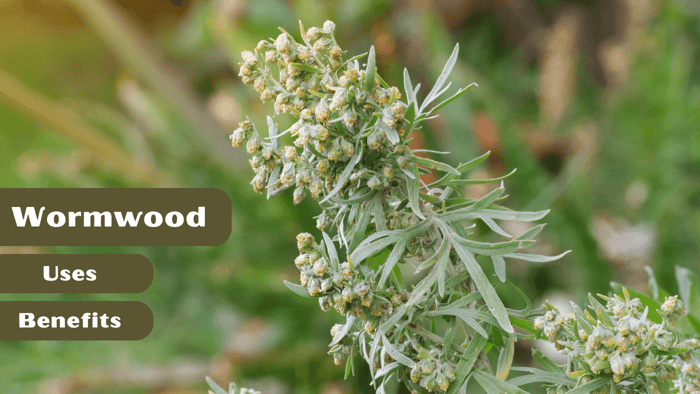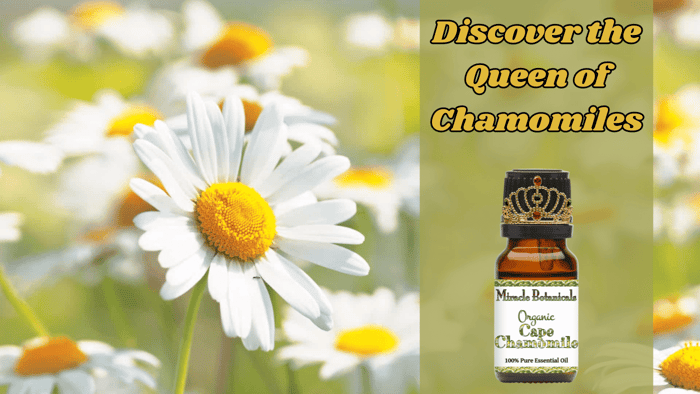Diving into wormwood uses benefits reveals a world where nature's profound gifts meet human health and wellness. As we explore the beneficial properties of wormwood in this article, it's essential to understand its role beyond traditional medicine. Wormwood's versatility is also evident in the modern sphere, where its essence is captured in two distinct essential oils, each variety offering its unique profile.
Common wormwood, scientifically, Artemisia absinthium, is more than just a perennial herb with a rich tapestry of historical medicinal uses; it's a botanical treasure trove. This shrub, thriving in the diverse climates of Europe, North Africa, and western Asia, and now also cultivated in North America, is renowned for its deeply lobed, grayish-green leaves and small yellow flowers that bloom in the warm embrace of July and August [1][2][3]. With its sage-like aroma and a taste that is notably bitter, wormwood essential oil packs a plethora of compounds such as sesquiterpene lactones and thujone, giving it an array of biological activities that may be beneficial as a remedy for ailments like parasites, rheumatoid arthritis, and Crohn's disease. Interestingly, it even stars as the active component in the enigmatic alcoholic drink, absinthe [3].
Historical Wormwood Uses Benefits
Wormwood's versatility and potency in traditional medicine cannot be overstated. Wormwood uses benefits span a broad spectrum, from digestive aid to a mystical ingredient in rituals:
Artemisia Absinthe - Common Wormwood
- Digestive System and Gastrointestinal Ailments:
- Wormwood has been a cornerstone in treating various digestive system issues, offering relief from bloating, gas, and other discomforts [7].
- Traditional medicine has utilized it for its anthelmintic, antiseptic, and antispasmodic properties, making it a go-to remedy for gastrointestinal ailments and helminthiases [4][5].
- External Uses and Ritualistic Significance:
- In the Realm of Beverages and Beyond:
- The herb's unique qualities have not only made it a key ingredient in absinthe and vermouth but also in a variety of aperitifs, spirits, and bitters, showcasing its broad applicability in the food industry [9][8].
- Regulations around its use in consumables highlight the cautious approach towards its potent thujone content, ensuring safety in its consumption.
Health Benefits of Absinthe Wormwood
Exploring the myriad of wormwood, artemisa absinthe, uses benefits; we uncover a spectrum of health advantages that underscore its significance in both traditional and modern medicinal practices. Here's a closer look at the compelling health benefits of wormwood:
- Pain and Inflammation Relief:
- Wormwood's anti-inflammatory properties, thanks to compounds like artemisinin, make it a natural choice for easing pain and inflammation that's been associated with osteoarthritis and rheumatoid arthritis [2][11][12].
- Its effectiveness in reducing pain and inflammation has been documented across various studies, offering a beacon of hope for those who seem to be dealing with chronic inflammatory conditions [2][11][12].
- Digestive and Antiparasitic Support:
- The herb is a powerhouse in stimulating digestive juices, enhancing blood flow in the digestive system, and offering relief from indigestion and gastritis [3][2].
- Its antiparasitic prowess is notable, with studies showing its ability to expel parasitic organisms and neutralize common intestinal parasites, including tapeworms [3][13][1].
- Antioxidant and Anticancer Potential:
- Wormwood's antioxidant properties, particularly through compounds like chamazulene, provide a protective shield against oxidative stress, potentially reducing cell damage [12].
- Intriguingly, research points to its potential anticancer effects, with studies highlighting its ability to inhibit the growth of human breast cancer cells [3].
Absinthe Wormwood in Herbal Remedies
Wormwood's versatility extends beyond its medicinal properties, finding its place in the realms of beauty and household care. It's fascinating to see how this herb dances through various uses:
- Fragrance and Cosmetics: Wormwood is not just a powerhouse of health benefits; it also lends its aromatic essence to soaps, cosmetics, and perfumes, adding a touch of nature's magic to our daily routines [14].
- Insecticide: Its application as a natural insecticide showcases wormwood's protective nature, safeguarding our homes from unwanted guests with a more eco-friendly approach [14].
In the heart of herbal medicine, wormwood shines with its leaves, flowers, and essential oils forming the crux of its healing essence:
- Herbal Medicine Staples: The leaves and flowers, along with the oil extracted from them, are pivotal in herbal remedies, embodying the spirit of natural healing [2].
- A Symphony of Compounds: The herb is a concert of beneficial compounds - essential oils, sesquiterpene lactones like absinthin, artemisinin, and a palette of phenolic acids, flavonoids, and coumarins, all contributing to its therapeutic prowess [3].
At Miracle Botanicals, Wormwood essential oils come in two varieties, each with its unique profile. While both harness the herb's potent properties, they cater to different wellness needs, reflecting the plant's multifaceted nature.
How to Use Wormwood Essential Oil
Essential oil of wormwood is a great way to take advantage of wormwood uses benefits. Derived from the Artemisia absinthium plant, wormwood has been used for its medicinal and aromatic properties for centuries. Here are some common ways to use wormwood essential oil:
Aromatherapy:
- Add a few drops of wormwood essential oil to a waterless diffuser.
- Inhale the aroma directly from the bottle to alleviate feelings of stress and anxiety.
Topical Application:
- Before applying it to the skin, dilute wormwood essential oil with a carrier oil, such as Rose Hip Seed or Kukui Nut Oil. The common dilution ratio of essential oil to carrier oil is 1% to 3%.
- Use the diluted oil for massage to help alleviate muscle aches and pains.
Insect Repellent:
- Mix wormwood essential oil with water and spray it around the house or on the body to repel insects.
Caution:
- Wormwood essential oil is potent and should be used in moderation.
- Do not ingest wormwood essential oil without consulting a qualified healthcare practitioner, as it can be toxic in large amounts.
Risks and Warnings
While we've been singing praises about wormwood uses benefits, it's crucial to strike a note of caution. Not all that glitters is gold, and the same goes for this power herb, especially when it comes to its thujone content. Here are some risks and warnings to keep in mind when considering wormwood uses benefits:
- Beta-Thujone
- Can cause neurotoxic effects
- May lead to convulsions and seizures in high doses
- Trans-Sabinyl acetate
- Generally recognized as safe, but high concentrations may cause skin irritation or sensitization
It's important to use essential oils sparingly, dilute them, consult your healthcare practitioner or an aromatherapist, and/or do your own research before using products containing these chemical components.
- Who Should Avoid Wormwood:
Remember, moderation is key, and being informed is your best ally.
Modern Research and Studies
Diving into more wormwood uses benefits, we unveil a treasure trove of phytochemical compounds that make this herb stand out in the world of natural remedies. Among the constituents, we find:
- Lactones, Terpenoids, and Essential Oils: These aromatic molecules give wormwood its distinct scent and therapeutic properties, aiding in everything from digestion to mental well-being [8].
- Organic Acids and Resins: Acting as the backbone of wormwood's medicinal benefits, these compounds contribute to its anti-inflammatory and antimicrobial effects [8].
- Tannins and Phenols: Not just for flavor, these components have antioxidant properties, helping to fight off free radicals and support overall health [8].
At the heart of wormwood's medicinal prowess lies the dimeric guaianolides, particularly absinthins, which are celebrated for their bioactive potency. This key ingredient is what sets wormwood apart, offering:
- Bioactive Ingredient: The absinthins in wormwood are the stars of the show, providing the herb with its renowned digestive, anti-inflammatory, and antimicrobial benefits [8].
Understanding the complex symphony of compounds within wormwood not only deepens our appreciation for this ancient herb but also underscores the importance of modern research in unlocking its full potential for health and wellness.
Conclusion
Through our comprehensive journey into the world of wormwood uses benefits, we've uncovered the multifaceted nature of this powerful herb, from its historical roots as a medicinal and mystical ally to its embrace in modern wellness and research. The exploration has illuminated not only wormwood's broad spectrum of health benefits, such as anti-inflammatory, digestive, and potentially anticancer properties, but also its significant role in the realms of beverages, beauty, and household care. Reflecting on these insights reinforces both the enduring legacy and the modern relevance of wormwood in enhancing human health and everyday life.
FAQs
What are the health benefits of the herb wormwood?
Wormwood is known for its numerous biological activities, as highlighted in a 2020 article. These include:
- Enhancing digestion and stimulating appetite.
- Acting as an antiparasitic agent.
- Inhibiting protozoan infections.
- Exhibiting antibacterial and antifungal properties.
- Offering anti-ulcer benefits.
- Protecting the liver from damage.
- Reducing inflammation.
How did Native Americans utilize wormwood?
Native Americans, particularly the Blackfeet, found various uses for wormwood. They chewed its leaves to increase stamina during runs and to alleviate stomach issues. Additionally, they applied chewed leaves on rheumatic joints and sore eyes for relief. Wormwood tea made from fresh leaves was also consumed to terminate challenging pregnancies.
Can wormwood affect brain health?
Wormwood contains thujone, a compound that stimulates the brain and can lead to seizures. Furthermore, it may reduce the effectiveness of certain anti-seizure medications, including gabapentin and primidone. It's also important to note that combining wormwood with heart disease medication like warfarin could result in intestinal bleeding.
What types of parasites can wormwood help treat - wormwood uses benefits?
Research, primarily animal studies, suggests that wormwood extract could be beneficial in treating various parasites. While human studies are limited, the evidence points to wormwood being potentially useful against tapeworms, roundworms, and pinworms, especially as a complementary treatment alongside antiparasitic drugs in regions where these parasites are prevalent.
References
[1] - https://www.webmd.com/vitamins/ai/ingredientmono-729/wormwood
[2] - https://www.verywellhealth.com/wormwood-5082001
[3] - https://www.medicalnewstoday.com/articles/wormwood
[4] - https://www.ahpa.org/herbs_in_history_wormwood
[5] - https://www.ncbi.nlm.nih.gov/pmc/articles/PMC7570121/
[6] - https://lafee.com/wormwood-history-myths/
[7] - https://www.quora.com/What-are-some-uses-for-wormwood-as-an-herb
[8] - https://www.ncbi.nlm.nih.gov/pmc/articles/PMC7345338/
[9] - https://en.wikipedia.org/wiki/Artemisia_absinthium
[10] - https://www.gaiaherbs.com/blogs/herbs/wormwood
[11] - https://www.healthline.com/nutrition/what-is-wormwood
[12] - https://www.health.com/wormwood-7110502
[13] - https://froemkelab.med.nyu.edu/surgery/content?ChunkIID=111819
[14] - https://www.rxlist.com/supplements/wormwood.htm
[15] - https://www.utep.edu/herbal-safety/herbal-facts/herbal%20facts%20sheet/wormwood.html









